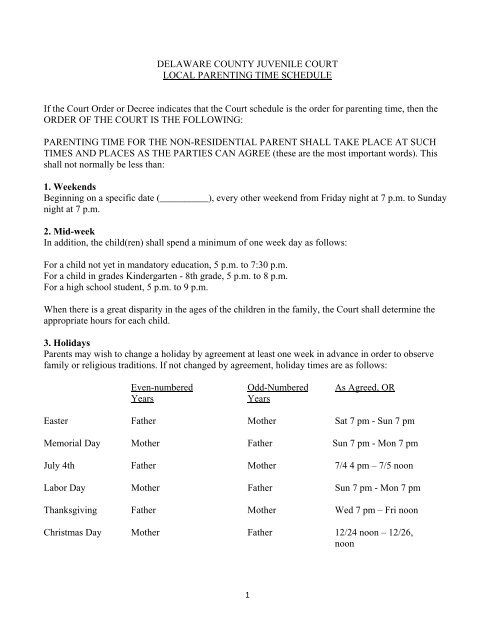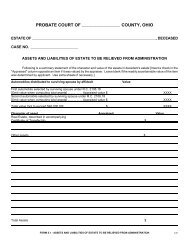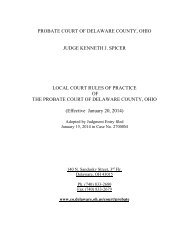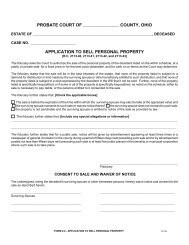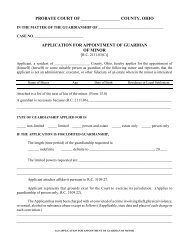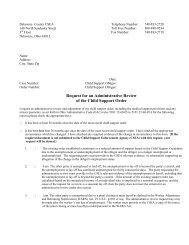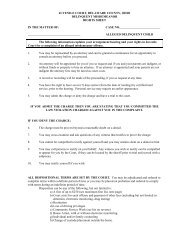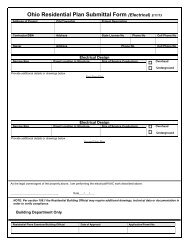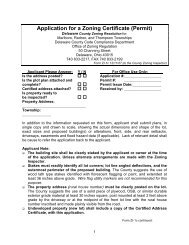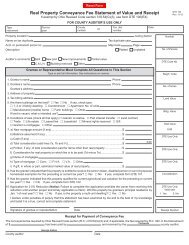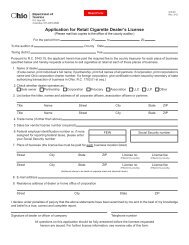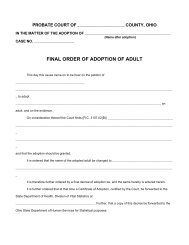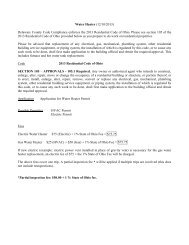Parenting Time Per Court Rule - Delaware County, Ohio
Parenting Time Per Court Rule - Delaware County, Ohio
Parenting Time Per Court Rule - Delaware County, Ohio
You also want an ePaper? Increase the reach of your titles
YUMPU automatically turns print PDFs into web optimized ePapers that Google loves.
DELAWARE COUNTY JUVENILE COURT<br />
LOCAL PARENTING TIME SCHEDULE<br />
If the <strong>Court</strong> Order or Decree indicates that the <strong>Court</strong> schedule is the order for parenting time, then the<br />
ORDER OF THE COURT IS THE FOLLOWING:<br />
PARENTING TIME FOR THE NON-RESIDENTIAL PARENT SHALL TAKE PLACE AT SUCH<br />
TIMES AND PLACES AS THE PARTIES CAN AGREE (these are the most important words). This<br />
shall not normally be less than:<br />
1. Weekends<br />
Beginning on a specific date (__________), every other weekend from Friday night at 7 p.m. to Sunday<br />
night at 7 p.m.<br />
2. Mid-week<br />
In addition, the child(ren) shall spend a minimum of one week day as follows:<br />
For a child not yet in mandatory education, 5 p.m. to 7:30 p.m.<br />
For a child in grades Kindergarten - 8th grade, 5 p.m. to 8 p.m.<br />
For a high school student, 5 p.m. to 9 p.m.<br />
When there is a great disparity in the ages of the children in the family, the <strong>Court</strong> shall determine the<br />
appropriate hours for each child.<br />
3. Holidays<br />
Parents may wish to change a holiday by agreement at least one week in advance in order to observe<br />
family or religious traditions. If not changed by agreement, holiday times are as follows:<br />
Even-numbered Odd-Numbered As Agreed, OR<br />
Years<br />
Years<br />
Easter Father Mother Sat 7 pm - Sun 7 pm<br />
Memorial Day Mother Father Sun 7 pm - Mon 7 pm<br />
July 4th Father Mother 7/4 4 pm – 7/5 noon<br />
Labor Day Mother Father Sun 7 pm - Mon 7 pm<br />
Thanksgiving Father Mother Wed 7 pm – Fri noon<br />
Christmas Day Mother Father 12/24 noon – 12/26,<br />
noon<br />
1
Mother's Day shall always be spent with the mother; Father's Day shall always be spent with the father,<br />
regardless of which parent is entitled to the weekend. If the parties cannot agree on times, the time is 10<br />
a.m. to 7 p.m. The child(ren) shall spend the rest of the weekend with the parent who normally has that<br />
weekend.<br />
Halloween (Beggars’ Night): Mother will have Beggars’ Night (trick or treat) in the even years and<br />
Father in the odd years through a child’s 6 th grade year if the parents live in communities that have<br />
Beggars’ Night on the same date. If the parents live in communities with separate dates for the event,<br />
then each parent gets the child(ren) on Beggars’ Night for his or her community. If the parents cannot<br />
agree on times, the hours will be from one hour prior to the start of Beggars’ Night to one hour after the<br />
conclusion of Beggars’ Night. Unless the parents agree otherwise, each parent will be responsible for<br />
providing the child(ren)’s costume for trick or treating or any other Halloween activities that occur<br />
during his/her own parenting time. Beggars’ Night is to be spent with the designated parent even if the<br />
other parent is entitled to weekend, mid-week, or vacation with the child(ren).<br />
Note: Holidays will take priority over any other parenting time. A holiday that falls on a weekend shall<br />
be spent with the parent who is designated to have the child(ren) for that holiday. The rest of the<br />
weekend is to be spent with the parent who would normally have that weekend. This time does not have<br />
to be made up.<br />
4. Other Days of Special Meaning<br />
The child's birthday shall always be spent with the mother in the even-numbered years, and shall always<br />
be spent with the father in the odd-numbered years. If the parties cannot agree, the time is 10 a.m. to 8<br />
p.m., for a child not in school on the birthday, and 5 p.m. to 8 p.m., for a child in school on the birthday.<br />
The other parent can celebrate on another date. Brothers and sisters shall attend the birthday event.<br />
A parent shall have the child(ren) for the parent’s birthday. If the parties cannot agree, the time is 10<br />
a.m. to 8 p.m., for a child not in school on the birthday, and 5 p.m. to 8 p.m., for a child in school on the<br />
birthday.<br />
Other special days or holidays shall be addressed on a case by case basis.<br />
5. Breaks<br />
Father will have spring school break in the even numbered years, and Mother will have spring school<br />
break in the odd numbered years.<br />
Winter break is to be divided equitably between the parents, with the exception of the Christmas holiday<br />
as set out above. For division purposes, Winter break is counted from the first day after school ends in<br />
December until the day before school resumes in January. Those days, less two days for Christmas,<br />
equal the days to be divided. In the event that the days cannot be divided equally, then the parent who<br />
does not have the child(ren) for Christmas that year gets the one extra day. Mother has the first half of<br />
Winter break in even years and second half of Winter break in odd numbered years. Father gets the first<br />
half of Winter break in odd numbered years and the second half of Winter break in even numbered<br />
years. Winter break begins at 7:00 p.m. on the last day of school before the break, and ends at 7:00 p.m.<br />
the night before school resumes.<br />
2
6. Summer <strong>Parenting</strong> <strong>Time</strong><br />
Unless parents otherwise agree, the child(ren) will alternate residing with each parent on a weekly basis,<br />
starting at 7 p.m. the first Friday after school has ended for the year to the following Friday at 7 p.m.<br />
The non-residential parent shall have the first week of summer parenting time. Summer parenting time<br />
continues until seven (7) days before school begins. Each parent’s time is calculated by taking the<br />
number of weeks between those two points and dividing in half.<br />
If the child(ren) attend daycare or are at a babysitter’s home in the summer, the parent with whom the<br />
child(ren) reside that week is responsible for the payment of daycare or babysitting costs for the week.<br />
Summer school necessary for a child to pass to the next grade must be attended. Regardless of either<br />
parent’s vacation plans, the child must attend all classes. The parent with whom the child resides that<br />
week must provide transportation to and from school.<br />
Each parent must provide the other parent in writing the destination, location, times of arrival and<br />
departure, contact information, and method of travel if the vacation will be outside the parent's<br />
community. This information shall be provided as soon as possible, but in no case less than two (2)<br />
weeks prior to the vacation.<br />
Extended travel plans/vacation, including overseas travel, will be given due deference by the <strong>Court</strong>.<br />
7. <strong>Parenting</strong> <strong>Time</strong> Presumptions<br />
a. Basis for Schedule<br />
This parenting plan presumes that the father and the mother are good parents and that a child is safe with<br />
either parent, based on the evidence before the <strong>Court</strong>; that the father and the mother respect the right of<br />
their child(ren) to have two parents throughout the child(ren)'s life for nurturing, continuity, normal<br />
development, and emotional and economic support; and the father and mother each respects the right of<br />
the other to parent their child(ren).<br />
b. Keeping the Children Together<br />
This schedule presumes that if the parents have more than one child, the parenting time will be exercised<br />
with all children together.<br />
c. Child's Response to <strong>Parenting</strong> <strong>Time</strong><br />
There is no specific schedule of parenting time that can address the changing needs of children and<br />
parents. It is important for parents to remain flexible based upon the needs of their children. As children<br />
mature and become involved in activities outside the home, they often have less time to spend with<br />
parents. The <strong>Court</strong> encourages parents to resolve parenting issues amicably as they occur.<br />
When relationships end, parents may experience a difficult time dealing with one another. <strong>Time</strong>s when<br />
children are physically transferred between the parents is NOT an opportunity to direct hostility,<br />
including demeaning language or behavior, towards the other parent. IT IS THE ABSOLUTE DUTY<br />
OF EACH PARENT TO MAKE CERTAIN THAT THE CHILD IS READY FOR PARENTING<br />
TIME WITH THE OTHER PARENT AND IS TRANSFERRED TO THE OTHER PARENT IN<br />
A TIMELY FASHION AT THE START OR CONCLUSION OF PARENTING TIME. IT IS<br />
THE ABSOLUTE DUTY OF EACH PARENT TO MAKE CERTAIN THAT HIS OR HER<br />
CHILD GOES FOR THE PARENTING TIME.<br />
3
The possessory parent shall have the child(ren) ready in a timely manner.<br />
d. Cancellation of <strong>Parenting</strong> <strong>Time</strong> by Non-residential Parent<br />
The non-residential parent must give notice of intent NOT to have parenting time, as soon as he or she is<br />
aware that it is not possible. A parent who does not exercise parenting time forfeits the time. A parent<br />
who continually fails to keep his or her commitment to parenting time may have his or her rights<br />
modified, and may be subject to other legal remedies.<br />
e. Make-up <strong>Time</strong> for Cancellation of <strong>Parenting</strong> <strong>Time</strong> by Residential Parent<br />
<strong>Parenting</strong> time shall be provided to the non-residential parent even if the child is ill, unless the child is<br />
hospitalized or a physician has recommended that the child not be removed from the residential parent’s<br />
house, in which case the residential parent is to notify the other parent immediately. Any time that is<br />
missed under this section is to be made up within fourteen (14) days.<br />
f. Transportation<br />
If the parties are unable to agree, then the parent coming into possession shall pick up the children at the<br />
mutually agreed upon or <strong>Court</strong> ordered location. If a parent is unable to pick up the child(ren), then he or<br />
she must use an adult driver well-known to the child(ren). All child restraint laws must be complied with<br />
by any person driving with the child(ren). No person transporting the child(ren) may be under the<br />
influence of drugs or alcohol. Only licensed drivers may transport the child(ren) and the financial<br />
responsibility laws (auto insurance) must be met.<br />
g. Grace <strong>Per</strong>iod<br />
The parent transporting the child(ren) for parenting time shall have a grace period of 15 minutes for<br />
pick-up and/or delivery if both parents live within 30 miles of each other. If the one-way distance to be<br />
traveled is more than 30 miles, the grace period shall be 30 minutes. In the event that the non-residential<br />
parent exceeds the grace period, that particular parenting time is forfeited unless the non-residential<br />
parent had notified the other parent and made other arrangements. In the event that the non-residential<br />
parent experiences an unavoidable accident, emergency, or traffic delay on the way to pick up the<br />
child(ren) and promptly notifies the other parent of the delay, then the parenting time is not forfeited. To<br />
put into effect the intent of this section, both parents should have working cell phones which are on and<br />
available during the proximate travel period for the exchange. If one or both parents do not have<br />
working cell phones, the parties should design an alternate and reasonable arrangement.<br />
h. Clothing and Possessions<br />
Clothing and possessions belong to the child(ren) and not to either parent. Clothing and possessions may<br />
travel back and forth between the parents’ homes. Neither parent may deliberately withhold clothing<br />
from the other parent. Security objects, such as a blanket, stuffed animal, or book, likewise belong to the<br />
child(ren) and may travel back and forth with the child(ren). Both parents are responsible to make sure<br />
the clothing and possessions return with the child(ren) at the end of the parenting time.<br />
i. Special Needs<br />
Where a child has special needs, including allergies and chronic conditions, the parent who has primary<br />
responsibility for the medical, therapeutic, and other such appointments shall keep the other parent fully<br />
informed as to the child’s medicines, treatments, equipment, therapeutic and educational modalities. A<br />
4
parent may not withhold any required medicines, equipment, or other items needed by the child(ren)<br />
during parenting time with the other parent. The parent receiving such medicines, equipment, and the<br />
like must return all items to the other parent at the conclusion of parenting time. The parent with whom<br />
the child is residing shall be responsible for maintaining and continuing all therapeutic and medical<br />
appointments, including transporting the child to and from the appointments. The <strong>Court</strong> has wide<br />
discretion to evaluate each case on a case by case basis and modify this rule as necessary.<br />
j. Schoolwork<br />
A parent must provide time for a child to study, complete homework assignments, papers, or other<br />
school assigned projects, even if the completion of this work interferes with the parent's plans with the<br />
children. If schoolwork is assigned by the school prior to the parenting time, the residential parent must<br />
inform the other parent of the work to be done, and when it must be completed. The residential parent is<br />
responsible for the child(ren) starting homework before leaving for parenting time with the other parent.<br />
k. Address and Telephone Numbers<br />
Each parent must, unless the <strong>Court</strong> orders otherwise, keep the other informed of his or her current<br />
address, email address, and telephone number, and, if available, an alternate telephone number in the<br />
event of an emergency. In the event that a parent lacks a telephone or cell phone, that parent must<br />
provide an emergency contact number. Both parents must notify the <strong>Court</strong> in writing of any intent to<br />
relocate.<br />
l. Traditions and Family<br />
This schedule is in no way meant to interfere with family traditions. Each parent is encouraged to<br />
respect each other's family traditions and to adjust the parenting time schedule accordingly. It is<br />
expected that the child(ren) will continue contact with grandparents, aunts, uncles, cousins, and any<br />
other family members during such times as they are with their parents.<br />
m. Children's Activities<br />
Scheduled parenting time periods shall not be delayed or denied because a child has other scheduled<br />
activities such as sports events, work, extracurricular activities, and social events with friends. Parents<br />
will discuss such activities in advance of any parenting time, including time, dates, and transportation<br />
needs, so that the child is not deprived of activities and maintaining their friendships. If there is<br />
equipment, uniforms, or other gear that the child will need to participate, the parent with those items will<br />
make sure the child has those things if the child will be at the other parent’s residence at the time of the<br />
event. It is the responsibility of the parent with whom the child is staying to make sure that the child gets<br />
to his or her practices, games, meetings, and the like. Both parents are encouraged to attend all their<br />
child's activities. Each parent is entitled by law to equal access to the student activities of their child,<br />
unless limited by <strong>Court</strong> Order.<br />
n. Illness or Injury of a Child<br />
No schedule can adequately spell out what should be common sense when dealing with an ill or injured<br />
child.<br />
If a child becomes ill or injured, warranting the giving of prescribed medication or consultation with a<br />
doctor or dentist, each parent must notify the other parent as soon as possible. If the child becomes ill<br />
while with the residential parent prior to a scheduled parenting time, the parent must contact the other<br />
5
parent and discuss the advisability of whether the parenting time should take place with the best interests<br />
of the child as the primary consideration. Parents should consider the nature of the illness (whether it<br />
may be contagious, or the child is physically uncomfortable, etc.), the care necessary, the ability to<br />
provide the care, exposure of the illness to others, activities planned, and any other important issues.<br />
If the parents agree that the child should be exchanged, then the residential parent MUST provide<br />
written instructions and sufficient prescribed medication to last during the parenting time. The nonresidential<br />
parent must care for the child as directed, notifying the other parent if the child's condition<br />
worsens, or does not improve as might reasonably be expected. If the parents cannot agree on whether<br />
the child should go, then the residential parent shall make the final decision. In the event that parenting<br />
time is canceled, the missed parenting time shall be made up within 14 days.<br />
o. Routine Medical and Dental Examinations<br />
The residential parent will notify the non-residential parent of all routine medical, dental, and optical<br />
examinations, such as well-child visits, physicals, and annual exams. The residential parent shall notify<br />
the other parent within 48 hours of making the appointment.<br />
p. Communication between Parents<br />
IT IS THE RESPONSIBILITY OF THE PARENTS, NOT THE CHILDREN, TO MAKE ALL<br />
PARENTING TIME ARRANGEMENTS. Neither parent should communicate with a child about the<br />
schedule or future events or activities which conflict with the other parent's allotted times. It is not the<br />
responsibility of a child to mediate or become involved in parental differences over times, dates or<br />
activities.<br />
q. Discipline and Behavior<br />
It is presumed that parents use methods of discipline consistent with the law, and consistent with each<br />
other as much as possible, and will communicate with each other if a child is becoming a discipline<br />
problem.<br />
Parents need to discuss behavior problems and solutions with each other as the need arises. Parents who<br />
have major disagreements over appropriate discipline or solutions to their child's problems and cannot<br />
resolve their disagreements should seek the assistance of professionals.<br />
r. Open Communication Between Parent and Child<br />
Open communication between parent and child(ren) is an aid to a stronger parent/child relationship and<br />
is in the best interests of the child(ren). The term “communication” includes, but is not limited to,<br />
telephone, texting, email, skyping, and other such electronic means. Communication is allowed as is<br />
age-appropriate and the <strong>Court</strong> may set parameters based upon the age of the child(ren) and the method<br />
of communication used. Oral communication, such as by telephone, will take place no less than three (3)<br />
times a week. Written communication, other than sending birthday or holiday cards, will take place after<br />
the child is able to read. For children six (6) years old and younger, communication will be pursuant to<br />
<strong>Court</strong> Order.<br />
Phone calls should be during the normal hours a child is awake; and if the child is unavailable for<br />
conversation, each parent shall take the responsibility of seeing that the child timely returns the call. A<br />
child is always permitted to call or contact a parent.<br />
6
s. Moving<br />
Either parent must notify the other at least thirty (30) days in advance of their intent to change their<br />
residence, and provide a new address and contact information within ten (10) days of establishing a new<br />
residence.<br />
t. Long Distance <strong>Parenting</strong> <strong>Time</strong><br />
<strong>Parenting</strong> time for a parents who live more than an hour’s driving time apart shall be considered by the<br />
<strong>Court</strong> on a case by case basis.<br />
u. Very Young Child(ren)<br />
This schedule may not apply to a newborn or very young child whose sense of time differs from an older<br />
child or adult. A newborn needs more frequent contact with a parent not living in the same household<br />
than this schedule specifies. Parents need to exercise more flexibility in scheduling times for a newborn<br />
and very young child(ren). The <strong>Court</strong> will set schedules on a case by case basis.<br />
v. Teenagers<br />
Parents should be as flexible as possible when it comes to teenagers as parents generally allow a<br />
teenager more freedom of choice. Significant teenage events such as proms or homecoming shall not be<br />
missed in order to accommodate a parenting schedule. A regular routine of parenting time may become<br />
more difficult as a child ages, has more activities outside of the family unit, obtains a driver's license,<br />
dates, works, and spends time with friends. Parents should respect their teenager opting to spend more<br />
time with friends or in organized activities, and less time with each parent, especially weekends and<br />
summer holidays. Maximum flexibility in scheduling is absolutely necessary for a child of this age.<br />
7


